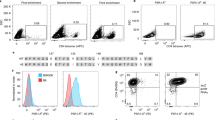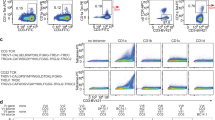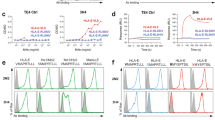Abstract
ANTIGEN-specific T lymphocytes appear to recognize foreign antigens in the form of peptide fragments presented within the antigen-binding groove of class I or class II molecules encoded by the major histocompatibility complex (MHC). Alloreactive T cells also show specificity for MHC molecules, and various reports suggest that residues of the MHC molecules constitute at least part of the ligand to which alloreactive T-cell receptors bind1–4. The X-ray crystal structure of the human MHC class I molecule, HLA-A25, has provided evidence to strengthen the argument that MHC-bound self-peptide6 might also contribute to such recognition7. We now provide direct evidence for this, showing that at least some alloreactive cytotoxic T lymphocyte clones recognize peptide fragments derived from cytoplasmic proteins. We reasoned that if self-peptides were involved in allorecognition, then the sequence of some of these peptides could vary between species, resulting in species-restricted distribution of the relevant ligand (s)8–11. Several alloreactive cytotoxic T lymphocyte clones specific for H–2Kb, expressed by the murine cell line EL4, did not lyse a human-cell transfectant expressing the H–2Kb molecule (Jurkat-Kb cells). However, these clones were able to lyse Jurkat-Kb cells sensitized by preincubation with an EL4 cytoplasmic extract cleaved by cyanogen bromide. The sensitizing activity from this extract was destroyed by protease and appeared to be due to a peptide consisting of 10 to 15 amino acids.
This is a preview of subscription content, access via your institution
Access options
Subscribe to this journal
Receive 51 print issues and online access
$199.00 per year
only $3.90 per issue
Buy this article
- Purchase on Springer Link
- Instant access to full article PDF
Prices may be subject to local taxes which are calculated during checkout
Similar content being viewed by others
References
Parham, P. et al. Nature 325, 625–628 (1987).
Clayberger, C. et al. Nature 330, 763–765 (1987).
Song, E. S., Linsk, R., Olson, C. A., McMillan, M. & Goodenow, R. S. Proc. natn. Acad Sci. U.S.A. 85, 1927–1931 (1988).
Schneck, J., Maloy, W. L., Coligan, J. E. & Margulies, D. H. Cell 56, 47–55 (1989).
Bjorkman, P. J. et al. Nature 329, 512–518 (1987).
Buus, S., Sette, A., Colon, S. M. & Grey, H. M. Science 242, 1045–1047 (1988).
Matzinger, P. & Bevan, M. J. Cell. Immun. 29, 1–5 (1977).
Barbosa, J. A. et al. Proc. natn. Acad. Sci. U.S.A. 81, 7549–7553 (1984).
Mentzer, S. J., Barbosa, J. A., Strominger, J. L., Biro, P. A. & Burakoff, S. J. J. Immun. 137, 408–413 (1986).
Koller, T. D., Clayberger, C., Maryanski, J. L. & Krensky, A. M. J. Immun. 138, 2044–2049 (1987).
Bernhard, E. J. et al. J. Immun. 139, 3614–3621 (1987).
Bernhard, E. J., Le, A. I., Barbosa, J. A., Lacy E. & Engelhard, V. H. J. exp. Med. 168, 1157–1162 (1988).
Kane, K. P., Sherman, L. A. & Mescher, M. F. J. Immun. 142, 4153–4160 (1989).
Manca, F. et al. Transplantation 36, 670–674 (1983).
Minami, M., Kawasaki, H., Taira, S. & Nariuchi, H. J. Immun. 135, 111–116 (1985).
Marrack, P. & Kappler, J. Nature 332, 840–843 (1988).
Langlet, C., Neil, G. A. & Sherman, L. A. J. Immun. 139, 3590–3596 (1987).
Irwin, M. J., Heath, W. R. & Sherman, L. A. J. exp. Med. (in the press).
Schultze, D. H. et al. Molec. cell. Biol. 3, 750–755 (1983).
Ralph, P., Nakoinz, I. & Rashle, W. C. Biochem. biophys. Res. Commun. 61, 1268–1275 (1974).
Kappler, J., White, J., Wegmann, D., Mustain, E. & Marrack, P. Proc. natn. Acad. Sci. U.S.A. 79, 3604–3607 (1982).
Zinkernagel, R. M. et al. J. exp. Med. 148, 592–606 (1978).
Pan, S., Wettstein, P. J. & Knowles, B. B. J. Immun. 128, 243–246 (1982).
Manser, T. J. Immun. 139, 234–238 (1987).
Gallily, R. & Feldman, M. Immunology 12, 197–206 (1967).
Vitiello, A. & Sherman, L. A. J. Immun. 13, 1635–1640 (1983).
Carbone, F. R., Moore, M. W., Sheil, J. M. & Bevan, M. J. J. exp. Med. 167, 1767–1780 (1988).
Author information
Authors and Affiliations
Rights and permissions
About this article
Cite this article
Heath, W., Hurd, M., Carbone, F. et al. Peptide-dependent recognition of H–2Kb by alloreactive cytotoxic T lymphocytes. Nature 341, 749–752 (1989). https://doi.org/10.1038/341749a0
Received:
Accepted:
Issue Date:
DOI: https://doi.org/10.1038/341749a0
This article is cited by
-
On the logic of restrictive recognition of peptide by the T-cell antigen receptor
Immunologic Research (2011)
-
Peptide-specific, allogeneic T cell response in vitro induced by a self-peptide binding to HLA-A2
Science in China Series C: Life Sciences (2007)
-
Memory alloreactive cytotoxic T cells do not require costimulation for activation in vitro
Immunology & Cell Biology (1996)
-
Graft versus leukemia
Immunologic Research (1992)
-
Persistent measles virus infection enhances major histocompatibility complex class I expression and immunogenicity of murine neuroblastoma cells
Cancer Immunology, Immunotherapy (1992)
Comments
By submitting a comment you agree to abide by our Terms and Community Guidelines. If you find something abusive or that does not comply with our terms or guidelines please flag it as inappropriate.



